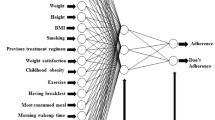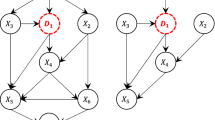Abstract
The prevalence of diabetes is increasing worldwide. Despite the advances in evidence based therapies, patients with diabetes continue to encounter ongoing morbidity and diminished health-related quality of life. One of the reasons for the diminished benefit from therapy is medication noncompliance. Considerable evidence shows that a combination of therapeutic lifestyle changes (increased exercise and diet modification) and drug treatment can control and, if detected early enough, even prevent the development of diabetes and its harmful effects on health. However, despite the fact that type-2 diabetes is treatable and reversible with appropriate management, patients frequently do not comply with treatment recommendations. In this paper, we use a combination of Expectation Maximization (EM) clustering and Artificial Neural Network (ANN) modeling to determine factors influencing compliance rates, as measured in terms of medication possession ratio (MPR), among patients prescribed fixed dose combination therapy for type 2 diabetes.
Access this chapter
Tax calculation will be finalised at checkout
Purchases are for personal use only
Preview
Unable to display preview. Download preview PDF.
Similar content being viewed by others
References
Wild, S., Roglic, G., Green, A., Sicre, R., King, H.: Global Prevalence of Diabetes: Estimates for the Year 2000 and Projections for 2030. Diabetes Care 27, 1047–1053 (2004)
Centres for Disease Control and Prevention: National Diabetes Fact Sheet: National Estimates and General Information on Diabetes and Prediabetes in the United States, 2011. U.S. Department of Health and Human Services, Atlanta (2011)
Conn, V.S., Hafdahl, A.R., Cooper, P.S., Ruppar, T.M., Mehr, D.R., Russell, C.L.: Interventions to Improve Medication Adherence among Older Adults: Meta-analysis of Adherence Outcomes among Randomized Controlled Trials. Gerontologist 49, 447–462 (2009)
Funnell, M.M., Anderson, R.M.: The Problem with Compliance in Diabetes. JAMA 284, 1709 (2000)
Cramer, J.A.: A Systematic Review of Adherence with Medications for Diabetes. Diabetes Care 27, 1218–1224 (2004)
Minet, L., Moller, S., Vach, W., Wagner, L., Henriksen, J.E.: Mediating the Effect of Self-Care Management Intervention in Type 2 Diabetes: A Meta-Analysis of 47 Randomised Controlled Trials. Patient Educ. Couns. 80, 29–41 (2010)
Scott, I.A., Denaro, C.P., Bennett, C.J., Hickey, A.C., Mudge, A.M., Flores, J.L., Sanders, D.C., Thiele, J.M., Wenck, B., Bennett, J.W., Jones, M.A.: Achieving Better in-Hospital and After-Hospital Care of Patients with Acute Cardiac Disease. Med. J. Aust. 180, 83–88 (2004)
Ralston, J.D., Revere, D., Robins, L.S., Goldberg, H.I.: Patients’ Experience with a Diabetes Support Programme Based on an Interactive Electronic Medical Record: Qualitative Study. BMJ 328, 1126–1159 (2004)
Asche, C., LaFleur, J., Conner, C.: A Review of Diabetes Treatment Adherence and the Association with Clinical and Economic Outcomes. Clin. Ther. 33, 74–109 (2011)
Fukunaga, L.L., Uehara, D.L., Tom, T.: Perceptions of Diabetes, Barriers to Disease Management, and Service Needs: A Focus Group Study of Working Adults with Diabetes in Hawaii. Prev. Chronic Dis. 8, 1–8 (2011)
Swift, E.E., Chen, R., Herschberger, A., Homes, C.S.: Demographic Risk Factors, Mediators, and Moderators in Youths’ Diabetes Metabolic Control. Ann. Behav. Med. 32, 39–49 (2006)
Leslie, R.S., Gwadry-Sridhar, F., Thiebaud, P., Patel, B.V.: Calculating Medication Compliance, Adherence and Persistence in Administrative Pharmacy Claims Databases. Pharma. Prog., 13–19 (2008)
Steiner, J.F., Prochazka, A.V.: The Assessment of Refill Compliance using Pharmacy Records: Methods, Validation, and Applications. J. Clin. Epidemiol. 50, 105–106 (1997)
Glidden, D.V., Vittinghoff, E.: Modelling Clustered Survival Data from Multicentre Clinical Trials. Stat. Med. 23, 369–888 (2004)
Patil, S.B., Kumaraswamy, Y.S.: Extraction of Significant Patterns from Heart Disease Warehouses for Heart Attack Prediction. IJCSNS 9, 228–235 (2009)
Hamou, A., Bauer, M., Lewden, B., Simmons, A., Zhang, Y., Wahlund, L.O., Tunnard, C., Kloszewska, I., Mecozzi, P., Soininen, H., et al.: Cluster Analysis and Decision Trees of MR Imaging in Patients Suffering. In: Demazeau, Y., et al. (eds.) Trends in PAAMS 2010. AISC, vol. 5, pp. 477–484. Springer, Heidelberg (2010)
Gwadry-Sridhar, F., Bauer, M., Lewden, B., Hamou, A.: A Markov Analysis of Patients Developing Sepsis using Clusters. In: Riaño, D., ten Teije, A., Miksch, S., Peleg, M. (eds.) KR4HC 2010. LNCS, vol. 6512, pp. 85–100. Springer, Heidelberg (2011)
Dempster, A.P., Laird, N.M., Rubin, D.B.: Maximum Likelihood from Incomplete Data via the EM Algorithm. J. R. Stat. Soc. 39, 1–38 (1977)
Bougenière, G., Cariou, C., Chehdi, K., Gay, A.: Non Parametric Stochastic Expectation Maximization for Data Clustering. In: Filipe, J., Obaidat, M.S. (eds.) ICETE 2007. CCIS, vol. 23, pp. 293–303 (2009)
Geisser, S.: Predictive Inference. Chapman and Hall, New York (1993)
Anderson, J.A.: Introduction to Neural Networks. Prentice-Hall, New Delhi (2001)
Penny, W., Frost, D.: Neural Networks in Clinical Medicine. Med. Decis. Making 16, 386–398 (1996)
Basheer, I.A., Hajmeer, M.: Artificial Neural Networks: Fundamentals, Computing, Design, and Application. J. Microbiol. Methods 43, 3–31 (2000)
Maglaveras, N., Stamkopoulos, T., Diamantaras, K., Pappas, C., Strintzis, M.: ECG Pattern Recognition and Classification using Nonlinear Transformations and Neural Networks: A Review. Int. J. Med. Inform. 52, 191–208 (1998)
The Waikato Environment for Knowledge Analysis, http://www.cs.waikato.ac.nz/ml/weka/
Jain, A., Zongker, D.: Feature Selection: Evaluation, Application and Small Sample Performance. IEEE Trans. Pattern Analysis and Machine Intelligence 19, 153–158 (1997)
Hosmer, D.W., Lemeshow, S.: Applied Logistic Regression, 2nd edn. Wiley- Interscience, New York (2000)
Author information
Authors and Affiliations
Editor information
Editors and Affiliations
Rights and permissions
Copyright information
© 2012 Springer-Verlag Berlin Heidelberg
About this paper
Cite this paper
Bahati, R., Guy, S., Gwadry-Sridhar, F. (2012). Analysis of Treatment Compliance of Patients with Diabetes. In: Riaño, D., ten Teije, A., Miksch, S. (eds) Knowledge Representation for Health-Care. KR4HC 2011. Lecture Notes in Computer Science(), vol 6924. Springer, Berlin, Heidelberg. https://doi.org/10.1007/978-3-642-27697-2_8
Download citation
DOI: https://doi.org/10.1007/978-3-642-27697-2_8
Publisher Name: Springer, Berlin, Heidelberg
Print ISBN: 978-3-642-27696-5
Online ISBN: 978-3-642-27697-2
eBook Packages: Computer ScienceComputer Science (R0)




